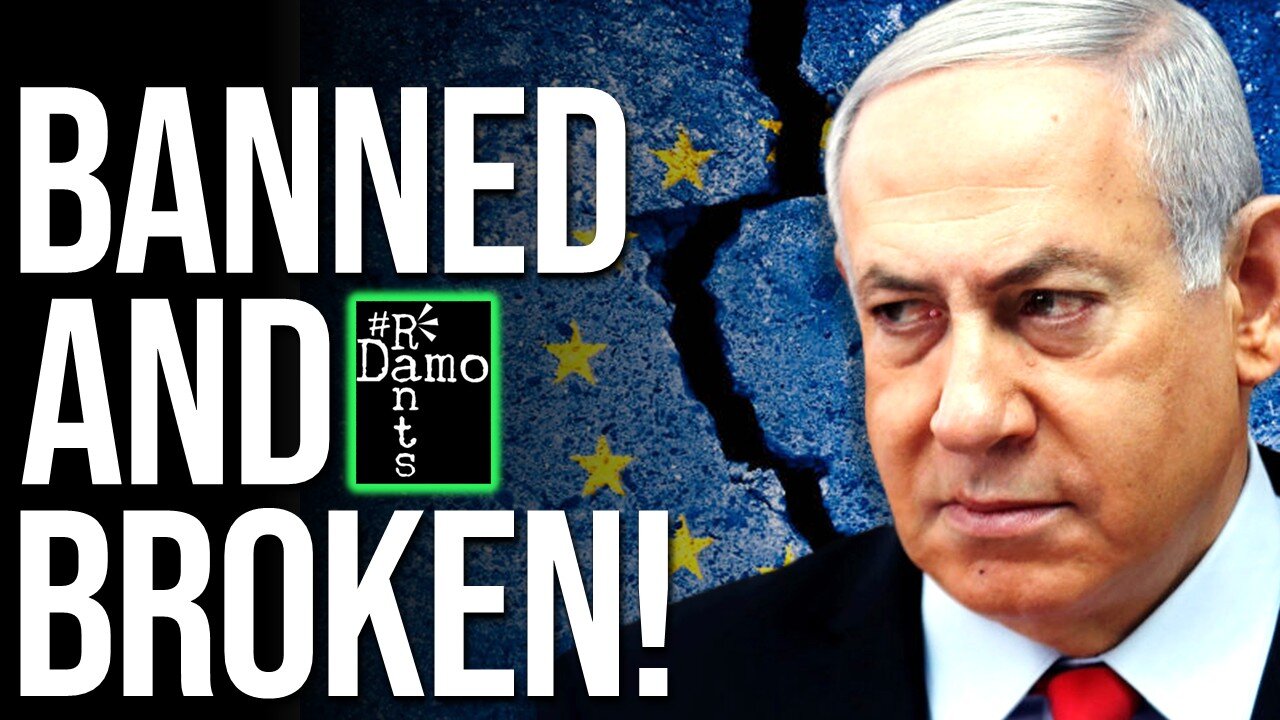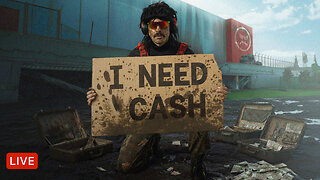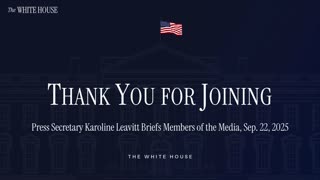Premium Only Content

Europe Has Always Backed Israel – But This Ban Changes Everything
Right, so Israel thought it could bomb Doha, starve Gaza, and sneer at the International Court of Justice while Europe stayed safely paralysed in its ritual of “grave concern.” For decades, that bet has of course been paying off though hasn’t it? Brussels wrung its hands, murmured about peace, and quietly signed the trade contracts anyway. Then the Netherlands, more and more making moves to hold Israel accountable of late, lit another fuse. With a few keystrokes in the Schengen database, Itamar Ben-Gvir and Bezalel Smotrich went from swaggering ministers to grounded pariahs across 29 European nations. They can rant all they like in Tel Aviv, but they won’t be strutting through Paris or Berlin anytime soon. Israel howled about antisemitism, but the real panic is simpler: once the taboo is broken, the dominoes fall. Today two bans, tomorrow trade suspensions, and soon perhaps Netanyahu himself, ICC arrest warrant aside, might be left peering at Europe from the outside. A precedent has been set, now let it escalate.
Right, so when Israel bombed Doha yesterday, it did more than strike a Gulf capital. It obliterated the pretence that diplomacy was still alive. Qatar had been the linchpin of ceasefire talks and hostage negotiations, the last fragile thread connecting Israel and Gaza to a mediated settlement. So by attacking it, Israel sent a clear message: there would be no safe space for negotiation, no respect for mediation, no line it was unwilling to cross. Diplomacy was dead, buried under the rubble of Qatari buildings.
Against this backdrop of reckless escalation, Europe looked paralysed as usual though. All the usual epithets came out. Statements of “grave concern” and “calls for restraint” issued from Brussels like the repetitive, tired wind emenating from a leaky bike tyre. For decades, this has been the EU’s role in this conflict though: wring hands, whisper platitudes, and carry on trading with Israel as usual. But one state this year has continued to shatter that mould. The Netherlands, not historically known for bold departures in foreign policy, broke with consensus and have already branded Israel a national security threat to them, have pushed for suspension of the EU-Israel trade deal and have now branded two senior Israeli ministers persona non grata. By entering Itamar Ben-Gvir and Bezalel Smotrich into the Schengen Information System, the Dutch government did more than slam their own airport doors shut. They slammed twenty-nine doors across Europe to them in a single stroke.
On the surface, it might look like symbolism — two extremist loudmouths targeted while Netanyahu and Israel Katz and the like are still able to glide through European capitals. But symbolism can shatter taboos. You have to start somewhere and precedent can be dynamite. What the Netherlands lit was a fuse, and it is now racing toward the powder kegs of Brussels and Berlin. Already Spain, Slovenia, and Belgium have followed the Dutch lead. Already Ursula von der Leyen, long Israel’s shield in Brussels, has been forced to partially suspend that EU–Israel trade agreement that the Dutch have pushed for. The façade of European paralysis has cracked. What was once unthinkable - Europe turning sanctions inward on Israel - might now perhaps be inevitable.
The Dutch decision to bar Ben-Gvir and Smotrich was announced in late July. It was not packaged as high theatre but as a bureaucratic act under Dutch immigration law: both ministers declared undesirable persons for threatening public order. But when the Netherlands uploaded their names to the Schengen Information System, or SIS, the consequences were much larger than that. The SIS is not a filing cabinet. It is the live operating system of Schengen borders. Once an entry is logged, it appears at every airport and land crossing. France, Germany, Spain, Norway, Switzerland — all are legally bound to refuse entry.
This means Ben-Gvir and Smotrich are barred not just from The Hague, but from Paris, Berlin, and Madrid. They cannot attend conferences, meet counterparts, or even transit through airports. No more Tel Aviv–Frankfurt–New York. They must reroute through Istanbul, Dubai, or London. The world just shrunk for them a lot.
This is why the Dutch move matters so much. For years, EU leaders hid behind the excuse that sanctions required consensus. The Netherlands just proved otherwise. One government, acting unilaterally, dragged twenty-eight others along with it because of how the SIS works. The precedent has been set: Europe is no longer locked in paralysis.
Israel of course exploded in anger. Foreign Minister Gideon Saar hauled in the Dutch ambassador for a reprimand, accusing the Netherlands of turning a friendship into hostility. The Israeli cabinet denounced the decision as an affront to Israel’s right to self-defence.
Ben-Gvir went further, deploying the oldest card in his deck. “A Jewish minister from Israel is unwanted,” he proclaimed, “while terrorists are free.” Smotrich accused Europe of surrendering to “the lies of radical Islam.” The strategy was obvious: drown accountability in the language of antisemitism, twist targeted sanctions into an assault on Jewish identity, it is what they always do, but it doesn’t work anymore does it?
But the fury revealed more than it concealed. If the ban were truly symbolic, Israel would have shrugged it off. Instead, it treated it as a crisis. Why? Because Israel knows contagion when it sees it. Today it is Ben-Gvir and Smotrich. Tomorrow it could be Saar. The day after, Katz. And after that, Netanyahu himself. Once Europe starts adding Israeli ministers to SIS, the protective wall of impunity begins to crumble.
Critics argue that the Dutch picked easy targets. Ben-Gvir and Smotrich are grotesque caricatures of extremism. They shout about expulsion while Netanyahu mutters about “humanitarian resettlement.” But the policy on the ground is the same: Gaza’s people starved, displaced, bombarded. By focusing on the loudest extremists, Europe gives Netanyahu cover to pose as the embattled centrist managing a rowdy coalition.
Yet this is precisely where symbolism becomes dangerous for Israel. Once the taboo is broken, precedent builds scaffolding. If Europe can brand Ben-Gvir a pariah for calling for expulsion, why not Katz, who openly boasted of blocking food convoys to induce famine? If Smotrich can be banned for denying Palestinian existence, why not the former Defence Minister Gallant, who already faces an ICC arrest warrant request? And once Gallant is in, what stops the net from tightening around Netanyahu himself, arrest warrant issued against him too?
Symbolism, in other words, is not a dead end. It is a door. The Netherlands opened it, and other states have already walked through, albeit by default. The excuses that isolate extremists while sparing “moderates” are collapsing under the weight of their own contradictions.
There is, of course, the question of whether every Schengen state will play by the rules. The system requires all members to honour the SIS ban, but there is a safety valve: in “exceptional circumstances,” a government can override it, citing humanitarian grounds or national interest. That means, in theory, a Schengen state could wave Ben-Gvir or Smotrich through, but what excuse would they need to pull that one off given who we are talking about here?
Yet such a breach would not be quiet. It would require notifying all other Schengen states, instantly making the decision public. It would be a declaration, not an accident — a government openly siding with Israel’s extremists against the collective border regime. Hungary might be tempted. Italy under Meloni could be, too. But the costs would be immense.
First, it would expose Schengen’s vulnerability, feeding domestic suspicion that common borders are already somewhat like Swiss cheese, full of holes. Second, it would paint the host government as Israel’s last refuge, rolling out the red carpet for men known worldwide for incitement to ethnic cleansing. The optics alone would be poisonous. Images of Ben-Gvir strutting in Budapest would not normalise him; they would deepen his stigma. Instead of isolating the Netherlands for acting, the rogue state would isolate itself for breaking ranks.
And the backlash could be worse still. If one member flouted the ban, the case for an EU-wide, binding travel blacklist would become irresistible. A Hungarian stunt could harden Brussels’ hand, especially after the fallout of Orban welcoming Netanyahu already, ignoring the ICC arrest warrant, transforming unilateral SIS entries into Council-sanctioned measures that no state could escape. What Orbán or Meloni might imagine as a favour to Israel could backfire into the very outcome Israel fears most: binding sanctions backed by EU law.
For Israel, then, there is no win. If the bans are respected, the walls of Europe are closed. If a rogue state breaks ranks, it may only accelerate the climb toward pariah status.
The Dutch action must also be looked at from a domestic context and the role ordinary people have played in this. In June, The Hague witnessed its largest protest in two decades. One hundred and fifty thousand people filled the streets, demanding an end to complicity in Gaza’s starvation. Polls show only 19 percent of Dutch citizens hold a favourable view of Israel, while 78 percent were unfavourable. Public opinion has turned, and with it, political space.
Foreign Minister Caspar Veldkamp resigned last month, citing his failure to secure stronger EU sanctions. His resignation was more than a personal statement. It was a warning: the Dutch government could not weather the storm of public anger without concrete action. The Schengen bans were the answer — something tangible to offer, more than words but less than the full sanctions coalition partners resisted.
This dynamic is repeating across Europe. In Spain, Belgium, and Ireland, public hostility to Israel’s conduct is fierce. Protests are swelling. Governments are being forced into action, not by moral clarity at the top, but by pressure from below. The Netherlands lit the path, and others are following.
The bans in The Hague reverberated in Brussels too. For decades, the European Commission has mouthed concern while maintaining Israel’s trade privileges under the EU–Israel Association Agreement. Article 2 of that agreement requires respect for human rights. Israel has trampled it for years without consequence.
Yet this has just changed too. Commission President Ursula von der Leyen — long seen as Israel’s staunchest protector in Brussels — was forced to propose a partial suspension. Still a way to go, but considering who we are talking about here, its pretty big. Preferential trade access would be pared back. Bilateral payments frozen, with token exceptions for civil society and Holocaust remembrance institutions. Even Israel’s champions could no longer hold the line.
This was no minor step. For the first time, the EU acted on Article 2, declaring Israel in breach. The façade of legal fiction collapsed. The Association Agreement, once untouchable, is now cracked open. Germany and Italy remain reluctant, but they are swimming against the tide.
The question now is not whether escalation continues, but how far. Travel bans can widen to include Gallant, Katz, and others. Full suspension of the Association Agreement looms. Arms embargoes, once unthinkable, are on the table in Madrid and Dublin. Financial sanctions could choke settlement-linked companies. And alignment with the ICC would mean Israeli leaders risk arrest the moment they step on European soil.
South Africa’s pariah status was not born overnight. It accumulated, piece by piece, until the edifice of apartheid collapsed. Israel may be walking the same path, God knows with all we’ve seen we hope so. The Netherlands’ gesture may one day be remembered as the first stone removed from the wall, a wall that needs to come crashing down.
The bombing of Doha is the game-changer. Qatar was the mediator of last resort, the broker of aid access and hostage talks. By striking its capital, Israel declared that it will not tolerate even the semblance of negotiation. It was not just a strike on a city. It was a strike on diplomacy itself.
In this context, symbolic bans are inadequate. They remain important scaffolding, but they cannot be the endpoint. Europe cannot pretend diplomacy is possible while Israel incinerates the very capitals trying to mediate. The Doha strike makes escalation imperative. Anything less is complicity.
Israel is drifting into pariah status in Europe. Public opinion has cratered. Protests are surging. Member states are acting unilaterally. Brussels is cracking under pressure. The ICC is circling with potentially more warrants. Each of these threads tightens the noose.
For decades, Israel relied on Europe’s inertia — the safe knowledge that condemnations would never translate into consequences. Well now they are. What began as bans on two extremist ministers has metastasised into trade suspensions and open talk of arms embargoes very quickly.
The excuses have run out. Netanyahu cannot hide behind Ben-Gvir and Smotrich forever. Europe knows that their extremism is only a louder version of his own policies. The only question is how far the pariah logic spreads — and when Netanyahu himself will find the Schengen gates closed in his face.
The Netherlands’ Schengen bans were more than symbolic. They were dynamite placed under the EU’s paralysis. One small state pressed “enter,” and twenty-nine borders slammed shut. Israel howled in protest, not because the measure was empty, but because it knew contagion was coming. Spain, Slovenia, and Belgium proved it right. Ursula von der Leyen, forced to act, proved it right. Protests in The Hague, Madrid, and Brussels proved it right.
Israel bombed Doha and buried diplomacy. Europe cannot pretend business as usual is still an option. The façade of impunity has cracked. The scaffolding for sanctions is rising. What begins as a ban on two ministers may end with Netanyahu himself branded persona non grata, his government cut off from European markets, and his generals facing arrest at European airports.
For Israel, this is not inconvenience. It is existential bad news. The Netherlands has shown the world that Europe can act, that excuses will no longer hold, and that the walls of impunity can shatter. From here, the question is not if escalation continues, but when. And when it does, Israel will discover that the world has grown very small indeed.
And of course this news has now come hot on the heels of a nine point plan announced by Spain just yesterday including a total arms embargo on Israel, Spanish ports and skies closed to Israeli arms transport, all illegal settlement goods outlawed, more funding for UNRWA, and Israeli war criminals threatened with entry bans here as well. Oh and just to wind Israel up even more, they’ve also called for nuclear talks with Iran. A Western nation opening the door to talks with Iran, you can imagine the wailing going on. Get all the details of that story in this video recommendation here as your suggested next watch.
Please do also hit like, share and subscribe if you haven’t done so already so as to ensure you don’t miss out on all new daily content as well as spreading the word and helping to support the channel at the same time which is very much appreciated, holding power to account for ordinary working class people and I will hopefully catch you on the next vid. Cheers folks.
-
 LIVE
LIVE
The Charlie Kirk Show
1 hour agoThe Charlie Memorial Aftermath | Benny Johnson, Sortor, Brick Suit | 9.22.2025
18,223 watching -
 LIVE
LIVE
Right Side Broadcasting Network
3 hours agoLIVE: White House Press Secretary Karoline Leavitt Holds a Press Briefing - 9/22/25
6,211 watching -
 LIVE
LIVE
Dr Disrespect
2 hours ago🔴LIVE - DR DISRESPECT TARKOV CHALLENGE - I NEED TO MAKE 5 MILLION... OR WIPE?
1,639 watching -
 LIVE
LIVE
Sean Unpaved
1 hour agoNFL Sunday Showdown: Browns' Brutal Blitz Best? Dart's Daring Debut Dawns, Bears Breakthrough!
299 watching -
 LIVE
LIVE
JuicyJohns
5 hours ago🟢#1 REBIRTH PLAYER 10.2+ KD🟢
55 watching -

The White House
3 hours agoPress Secretary Karoline Leavitt Briefs Members of the Media, Sep. 22, 2025
2.91K4 -
 1:05:07
1:05:07
Timcast
2 hours agoTrump Orders DOJ Bondi To Prosecute Democrats In Public Statement
141K64 -
 2:15:20
2:15:20
Steven Crowder
4 hours agoCharlie Kirk Conspiracies Spread Like Wildfire: What's Really Going On?
452K539 -
 LIVE
LIVE
Nerdrotic
6 hours ago $0.94 earnedStar Wars: Mandalorian and Grogu Trailer Reaction - Nerdrotic Nooner 518
501 watching -
 LIVE
LIVE
Rebel News
1 hour agoOstrich cull imminent, Rebel on the ground | Rebel Roundup
498 watching